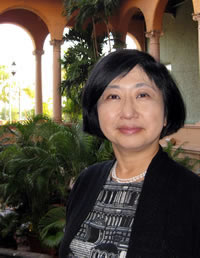
It has been five years since the Center for the Humanities was established at the University of Miami. During fall 2013, we concluded a review of the Center and its administration as mandated by the University’s Faculty Senate. As external reviewers, three Center directors—Victor Bailey, Hall Center for the Humanities, University of Kansas; Susan Stanford Friedman, Institute for Research in the Humanities, University of Wisconsin, Madison; and S. Hollis Clayson, Alice Kaplan Institute for the Humanities, Northwestern University—conducted extensive interviews with faculty and dissertation fellows, conveners of research groups, chairs of humanities departments, and reported their findings to the Dean of the College of Arts and Sciences and the Provost. The Center also conducted a survey of students and faculty to gather their assessment of the Center’s programs.
I am very happy to report that both the surveys and the external review were highly favorable. In the survey, 100% of the active humanities faculty responded that the Center is “very effective” or “somewhat effective” (overwhelmingly “very effective” by a 3 to 1 margin) in the following areas: “Acting as a catalyst for interdisciplinary work”; “Creating a vibrant intellectual environment on campus”; and “Providing a strong voice for the humanities within the University.”
The reviewers stated that since its inception, the Center “has succeeded in becoming central to the intellectual life of the College of Arts and Sciences at the University of Miami both in and beyond the humanities, [and] it has favorably impacted sectors of the broader University and general public as well. Its initiatives and advocacy for the humanities have been especially important to the active members of the humanities faculty, whose scholarship is fostered and stimulated by its programs; but the Center’s programs have positively affected non-Humanities faculty, and graduate and undergraduate students along with members of the broader Miami community.” The reviewers emphasized the importance of the research fellowships and interdisciplinary research groups for faculty development, stating that the fellowship program “has had an enormous impact by fostering interdisciplinary dialogue in the humanities, enhancing faculty and graduate student research.” Concerning the research groups, they stated: “We are especially impressed with how many concrete research products (books, journal issues, journals) come out of these groups, as well as other Center symposia.” The reviewers concluded, “More than one faculty member we interviewed expressed the opinion that the excellence of the Center for the Humanities has helped the University of Miami become a real research university. The Center for the Humanities is emphatically something that the University should continue to support.”
2013-14 also brought three Henry King Stanford Distinguished Professors, Dava Sobel, Victor Mair, and Alma Guillermoprieto, who each held a variety of programs aimed at both faculty and students, both graduate and undergraduate, in diverse disciplines. The Center helped organize and secure funding for the “Thinking Queer Activism Transnationally” symposium sponsored by the Center’s Queer Studies Research Group. The Center also presented a number of workshops and seminars for faculty and graduate students: one on grant-writing led by Arthur Marotti; another on mentoring, led by Marotti and Susanne Woods; and yet two others on digital pedagogy and presentation software led by Shigehisa Kuriyama.
Two new initiatives that the Center supported are programs addressing the question of expanding career opportunities for humanities Ph.D.s and exploring opportunities and possibilities in digital humanities research.
Responding to the external reviewers’ praise of our interdisciplinary research groups, the faculty board approved three new groups: Digital Humanities; Modernities; and the Graduate Students’ Critical Theory Group, organized and led by graduate students.
For 2014-15, the Center has invited as Henry King Stanford Distinguished Professors Robert Proctor, Professor of History of Science at Stanford and a specialist on 20th- century science, technology, and medicine (September, 2014); Rita Dove, former US Poet Laureate and a Commonwealth Professor at the University of Virginia (February, 2015); and William Wallace, Barbara Murphy Bryant Distinguished Professor of Art History at Washington University in St. Louis and the world’s foremost authority on Michelangelo (April, 2015). In addition, we will present as the inaugural Edith Bleich speaker Carol Berkin, Presidential Professor of American Colonial and Revolutionary History and Women’s History at CUNY Graduate Center (October, 2015). We have also organized a series of lectures and seminars throughout the year on Digital Humanities in collaboration with the College of Arts and Sciences and Otto G. Richter Library.
I take this occasion to thank the Center’s faculty board for their counsel, and our Dean of the College of Arts and Sciences, Leonidas G. Bachas, our Provost Thomas J. LeBlanc, and our President Donna E. Shalala, for their ongoing support of the Center and the Humanities. I also acknowledge the hard work of our Associate Director Kyle Siebrecht, Administrative Assistant Zureyka Carsi, and Secretary Claudia Cuador, as well as Student Assistants Amelia Abe, Jennifer North, Samantha Richard, Devin Weinstein, and Micah Weinstein.
Mihoko Suzuki
Director, Center for the Humanities
Professor of English




